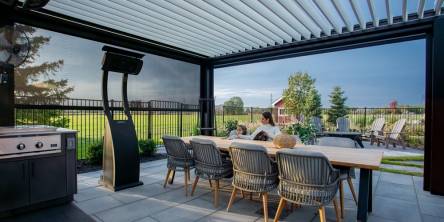What Problems Can Smart Home Automation Systems Help You Solve?

The idea of a home that runs itself used to belong in science fiction. But now, it’s a reality. No one speaks in robotic voices or asks their home to execute tasks. Instead, smart home automation systems quietly work in the background, solving problems people didn’t know they had until they stopped having them. A home should not require constant maintenance, reminders, or small acts of servitude that add up over time.
In fact, a home should let people live, not manage it like a second job. But that is what many do, without realizing it, until they automate the things that slow them down. Some say automating everything makes people lazy. However, there’s no honor in wasting time on tasks that don’t need human involvement. Smart home automation systems solve real problems—ones that interrupt a peaceful morning, create unnecessary stress and make people feel like they’re one step behind in their own homes.
This article lists various problems you can solve using a home automation system.
1. Forgetting Things That Shouldn’t Be Forgotten
Some people forget to lock the front door. Others forget the lights in every room, leading to a house that glows like an airport runway. Forgetting isn’t just inconvenient. It’s expensive and, in some cases, dangerous. A smart home automation system prevents these mistakes before they happen. Leaving home shouldn’t involve an internal checklist of every possible oversight. Automation eliminates that routine. Instead of wondering whether the coffee maker is still on, people can leave the house with a quiet confidence that everything is as it should be. In a smart home, locks can engage themselves, lights can turn off when no one is in the room, and thermostats can lower automatically instead of blasting cool air into an empty house. A smart home doesn’t just run more smoothly—it removes the worry of walking back inside to double-check things that should have been taken care of already.
2. Wasting Time on Repetitive Tasks
No one moves through a house enthusiastically, turning lights on and off. It’s not a joy to adjust the thermostat multiple times a day. These are tasks done out of habit, not because they bring any sense of accomplishment. A smart home automation system removes the need for such rituals. Automation makes small tasks disappear. Speaking of which, a light turns on when someone enters a room. The thermostat adjusts based on the time of day or the weather outside. Blinds lower themselves in the evening. None of this requires a person to lift a finger. And without the need to do these things, the time spent on them is returned. Some will say pressing a button isn’t hard. They’re right. But it’s also not necessary when something else can do it better. There’s no dignity in spending time on something a system can do more efficiently. The fewer interruptions in a day, the more energy there is for things that matter.
3. Losing Control of Energy Bills
Energy use is like a leaky faucet. A little waste here, a little waste there, and suddenly, the bill is higher than expected. In such a situation, a smart home automation system stops waste before it happens. It’s not about turning things off. It’s about knowing when they need to be on in the first place. Smart lighting knows when a room is empty or occupied and turns lights on or off. Appliances can power down instead of sitting in standby mode, drawing energy for no reason. The result isn’t just lower bills but a home that isn’t throwing money away for no reason. Energy efficiency isn’t about making dramatic sacrifices. It’s about eliminating waste that no one benefits from. There’s no comfort in cooling an empty room or an oven humming with nothing inside it. Automation makes a home run like it should—without the unnecessary excess.
4. Security That Works Without Thinking About It
Home security shouldn’t require effort. If a system depends on someone remembering to set it, it’s flawed. A smart home automation system removes the burden of remembering. Security is built into how the home operates, not something to turn on and off like a light switch. Traditional security relies on habits. Habits can be broken. Having said that, a smart system doesn’t forget. It doesn’t get lazy or distracted. It protects without effort, which is exactly how security should work. In a smart home, doors can lock themselves, cameras can activate when motion is detected, and lights can turn on automatically to give the illusion of someone being home. These aren’t extra steps; they’re part of a home that secures itself. No one has to wonder if they armed the alarm before leaving. The system handles it.
5. Keeping Up With Household Maintenance
Every home needs maintenance. Once in a while, you’ll find a filter that needs to be changed or a pipe that needs attention before it bursts. Most people don’t keep track of these things until they become problems. A smart home automation system prevents small issues from turning into disasters. No one enjoys unexpected repairs. They come at the worst times and cost more than expected. A smart home doesn’t eliminate maintenance but makes it predictable. And in a home, predictability is always better than a surprise. In a smart home, sensors can detect leaks before there’s water damage, trigger maintenance reminders before an appliance breaks down, and automatically schedule even something as small as an air filter replacement. These aren’t conveniences; they’re essential safeguards against bigger problems.
Final Thoughts
A smart home automation system isn’t about luxury. It’s about removing the problems no one needs to have in the first place. Thus, a home that functions independently gives back time, saves money, and prevents stress that builds up in small, unnoticed ways. People who insist on doing everything manually don’t earn any extra credit. Furthermore, no one hands out awards for remembering to lock the door or adjust the thermostat on cue. That said, efficiency isn’t laziness; it’s time-saving. So, next time you want to save time and have peace of mind, consider a smart home.
Similar Articles
Every year, as the holiday season approaches and homeowners begin decorating their properties with festive lighting, emergency electricians see a predictable spike in service calls.
Walk into a bathroom remodeled in the last five to ten years, and you’ll notice a common thread: fewer visual barriers.
Learn how septic system cleaning products restore flow naturally, breaking down waste, preventing clogs, and keeping your system healthy.
A louvered pergola is an outdoor structure with a mechanically adjustable roof system. Its purpose is to regulate sunlight, airflow, and precipitation in open-air environments.
You do not always need to do a major renovation, a huge budget, or even employ a contractor to make improvements on your home.
Struggling with recurring roof repairs? Discover why issues keep coming back, from poor installation to mismatched materials, and learn how to avoid costly fixes.
Explore modern wooden tiles designs, finishes, patterns & colour trends. Discover ceramic and vitrified wood tiles for timeless, elegant interiors.
Learn how an HVAC contractor provides reliable heating and cooling through expert installation, repairs, maintenance, and energy-efficient solutions.
Gutters play a critical role in directing rainwater away from a home, yet they are often overlooked in routine maintenance. Because they sit above eye level, problems can develop quietly until visible damage appears on walls, foundations, or interior spaces.









